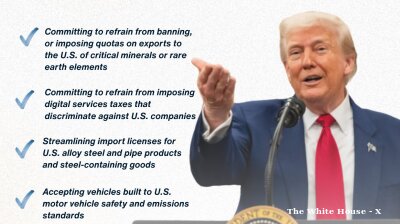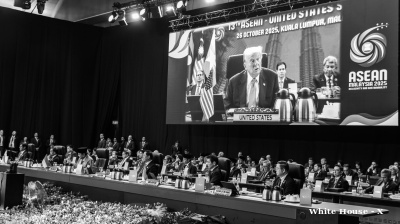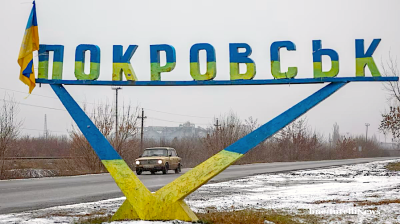Brazil's economy is experiencing a period of robust growth, but this success is accompanied by a series of challenges, mostly high borrowing costs which continue denting consumption among many Brazilians.
The country's central bank, Banco Central do Brasil (BCB), raised its main interest rate benchmark, the Selic, to 10.75% in September, bucking the trend of easing monetary policy seen in other Latin American countries and globally.
This decision has sparked debate among economists and policymakers. The BCB's move came just before inflation data showed an unexpected slowdown during the first fortnight of September – according to the Brazilian statistics office IBGE, inflation in the first two weeks of September slowed to 0.13% from 0.19% in August, with annual inflation dropping to 4.12% from 4.35%.
Despite that two-week break in price rises, the central bank’s governor, Roberto Campos Neto, defended the rate hike as voices starting to question its wisdom.
"We believe that, at that moment, with the information we had at that time, with the visibility we had, it was the course to be followed,” he said.
On a more positive note, the central bank has sharply raised its GDP growth forecast for 2024 to 3.2%, up from June's estimate of 2.3%. For 2025, the bank expects GDP growth of 2% - aligning itself with some of the most optimistic forecasts, Bloomberg reported.
This week, the Boletim Focus weekly survey, which gathers forecasts from over 100 economists, showed expectations of two more 0.50 percentage point Selic rate increases in November and December, potentially reaching 11.75% by year-end, O Globo reported.
The survey also projects inflation to end 2024 at 4.37%, 2025 at 3.97%, and 2026 at 3.60%.
Employment in Brazil has reached record levels, with the unemployment rate dropping to 6.6% in the quarter ending in August, the lowest since the survey began in 2012. The employed population has grown to 102.5mn, an increase of 2.9mn year to date, according to official figures.
Brazil's unemployment rate reached a new record low of 6.6% in the quarter ending in August, according to IBGE, down half a percentage point from the March-May 2024 quarter (7.1%).
IBGE said the rate was the lowest in the historical series of the Continuous National Survey, which began in 2012.
However, this employment boom is accompanied by concerns about low wages. The minimum wage remains set at a meagre BRL1,412 per month ($260/month) for 2024. Not only that – the minimum wage is practically the average wage in many sectors, with some small benefits added as mandated by labour regulations.
Therefore, it is common to find many Brazilians with two jobs, especially in the big, higher-priced urban areas such as Sao Paulo or Rio de Janeiro – simply because otherwise they could hardly cope with rising prices.
Credit in Brazil is an extended form of payment. Even the smallest purchases can be bought in instalments – a coffee, a beer, a meal – and that is why interest rates matter a lot. For many, it is just another way to make ends meet.
With banks always having the best part of the cake, the government is also looking at credit for ordinary consumers as debt piles often can spiral out of control.
Moreover, in one of the world’s most unequal countries, it is not uncommon to find salaries among professional workers which equal or even surpass salaries in European nations. An office cleaner will almost certainly earn a minimum wage, while some coworkers in the same building can easily earn ten times more. It is the display of inequality in full view, a common theme in many Latin American countries.
Low salaries remain a thorn in Brazil's side. Many graduates will openly say that, instead of getting jobs with average wages at around BRL3000/month as they start their careers, they would rather try their luck abroad, where the pay reflects their qualifications,
To conclude on a positive note, this fascinating table by accounting firm Contabeis shows Brazil’s minimum wage evolution since 1994 when the real was already firmly in place during Fernando Henrique Cardoso's economic stabilisation reforms, which gave way to Lula's successes in its first and second terms (2003-2011). The table does not show the 2024 figure mentioned above.
CREDIT, CREDIT, CREDIT
President Luiz Inacio Lula da Silva has been actively lobbying for improvements in Brazil's credit rating, which in turn could lower borrowing costs in the mid and long term, Brazil Journal reported.
During a visit to New York for the UN General Assembly last week, Lula met with credit rating agencies alongside Economy Minister Fernando Haddad. Following these meetings, Moody's upgraded Brazil's sovereign rating from Ba2 to Ba1, just one notch below investment grade.
"I called the rating agencies because it is important for them to hear what is happening in the country from the president of the Republic. You don't just need to listen to businesspeople in Faria Lima [Sao Paulo’s financial district]. Listen to the workers and to the president of the Republic as well," said Lula.
Despite this upgrade, some economists remain sceptical about Brazil's fiscal outlook. Carlos Kawall, former Treasury secretary, said Moody's assessment of fiscal risks had been benevolent.
“We are not seeing a reduction in debt, on the contrary, and the cost of debt has increased compared to what it was at the beginning of the government," he said.
Solange Srour, economist at UBS Wealth Management, added a more critical view: "A country that needs to finance a debt of about 80% of GDP at real interest rates of 6.5% cannot afford to think that debt growth does not matter. If the investor does not have a stabilisation horizon, it will continue to ask for more premium [to lend its money]."
Fitch, another major rating agency, maintained a more cautious stance. In a note published on September 26, it warned that while Brazil's economy shows strong momentum, fiscal challenges persist.
The agency kept its Brazil rating at BB with a stable outlook, firmly below investment grade.
Fitch raised its 2024 real GDP growth forecast for Brazil to 2.8%, up from 1.7%, but expressed concerns about the government's fiscal policies.
“Containing spending is proving challenging. Pensions have risen faster than expected this year, prompting cuts to discretionary expenditures to comply with a spending cap. Indexation and earmarking will keep pressure on social expenditures in the next few years, requiring a further squeeze of discretionary spending to compensate that could eventually become unviable,” the agency stated.
“To avoid this, the authorities are working to reduce fraud in social programmes and considering changes to some rules and indexation mechanisms. But the political appetite for changes that deliver major relief remains unclear.”
And yet again, Brazilians’ high levels of indebtedness come back into focus. Fitch said the central bank’s “mini-monetary tightening cycle” is to immediately lift interest payments, given a high share (45%) of floating-rate debt Brazilian households and companies hold.
News

US Treasury Secretary Bessent blasts “Russian propagandist” special envoy Dmitriev in Washington PR debacle
A trip to Washington by the Kremlin’s special business envoy Kirill Dmitriev days after the US imposed new oil sanctions turned into a debacle after US Treasury Secretary Scott Bessent blasted him as a “Russian propagandist.”

Trump pledges enduring support for Southeast Asia as new trade deals signed
During his visit to Southeast Asia, US President Donald Trump declared that Washington would remain a steadfast ally to the region, as he signed a series of trade agreements with four ASEAN member states.

US grants 0% tariffs to Malaysia alongside Cambodia and Thailand
US President Donald Trump has approved a 0% tariff scheme for selected goods from Malaysia, Cambodia, and Thailand, a move formalised during the ASEAN Summit in Kuala Lumpur.

Russia test fires its Burevestnik nuclear-powered cruise missile
Russia’s Burevestnik nuclear-powered cruise missile has no analogues in the world, Russian President Vladimir Putin said, as the Kremlin escalates the unfolding missile arms race with Ukraine another notch.

_(cropped)_Cropped.jpg)
.jpg)
_1761305900.jpg)
